The Five Points of Fellowship contain the essence of the doctrine of brotherhood.
In the Old Constitutions as explained in the Halliwell or Regius manuscript are fifteen regulations called points.
The old verse runs:
![]()
Fifteen artyculus there they soughton
And fifteen poyntys there they wrogton
Phillip’s New World of Words, published in 1706 defines point as “a head or chief matter.”
An operative Mason “points” the wall by filling in the chinks left in laying bricks or stone, thus completing the structure.
Our Five Points of Fellowship are not allied to these, except as they are reflected in the word “points.”
We also find this relationship in the Perfect Points of Entrance, once called Principal Points.
A change was made in the symbolism of the Five Points in 1843, at the Baltimore Masonic Convention.
Prior to that time the Five Points were symbolised by hand, foot, knee, breast, and back.
After 1843 the hand was omitted and the mouth and ear tacked on as the fifth.
Mackey believed that:
“The omission of the first and the insertion of the last are innovations and the enumeration given…
is the old and genuine one which was originally taught in England by Preston and in this country by Webb.”
Such curiosities of ritual changes, though interesting, are more for the antiquarian than the average lodge member.
Most of us are more concerned with a practical explanation of the Five Points as they have been taught for more than a hundred years.
A man goes on foot a short distance by preference; for a longer journey he boards a street car, rides in an automobile, engages passage on a railroad or courses through the air in a plane.
Service to our brethren on foot does not imply any special virtue in that means of transportation.
The word expresses the willingness of him who would serve to go at inconvenience and with difficulty, if necessary.
We assist our brethren when we can; also we serve them. The two terms are not interchangeable.
We cannot assist a brother without serving, but we may serve him without assisting him.
A wholly negative action may be a service; suppose we have a just claim against him and because of our fraternal relations we postpone pressing it.
That is true service, but not active assistance, such as we might render if we gave or loaned money.
How far should we go on foot to render service? Nothing is said in the ritual but the cable tow is elsewhere used as a measure of length.
Our own conception of brotherhood must say how far we travel to help our brother. To petition at the altar of the Great Architect of the Universe before engaging in any great or important undertaking is sound Masonic doctrine.
We name the welfare of our brethren in our petitions because we love them; knowing our own need of their prayers, we realize their need of ours.
Anciently it was written Laborare est orare – to labour is to pray. If indeed labour is prayer, then to pray for our brethren we may labour for them, which at once clarifies the Second Point and makes it a practical, everyday, do-it-now admonition.
To work for our brother’s welfare is in the most brotherly manner to petition the Most High for him.
We often associate something less than proper with the idea of a secret.
“He has a secret in his life”; “he is secretive”; “he says one thing but in his secret heart he thinks another” seem to connote some degree of guilt with what is secret.
We keep our brother’s secrets, guilty or innocent, but let us not assume that every secret is of a guilty variety.
He may have a secret ambition, a secret joy, a secret hope – if he confide these to us, is our teaching merely to refuse to tell them or to keep them in the fine old sense of that word – to hold, to guard, to preserve?
The Tiler stands watch and ward not to keep the door from others, but to see that none uses it improperly.
Thus are we to keep the secret joys and ambitions of our brother close in our hearts until he wants them known, but also, by sympathy and understanding, help him to maintain them.
“Do you stumble and fall, my brother? My hand is stretched out to prevent.
Do you need aid? My hand is yours – use it.
It is your hand for the time being. My strength is united to yours.
You are not alone in your struggle – I stand with you on the Fourth of the Five Points and as your need may be, so, Deo volente, will be my strength for you.”
So must we speak when the need comes. It makes no difference in what way our brother stumbles; it may be mentally; it may be spiritually; it may be materially; it may be morally.
No exceptions are noted in our teachings. We are not told to stretch forth the hand in aid if, and perhaps, and but!
Not for us to judge, to condemn, to admonish… for us only to put forth our strength unto our falling brother at his need without question and without stint.
For of such is the Kingdom of Brotherhood.
More sins are committed in the name of the Fifth of the Five Points than in the name of Liberty!
Too often we offer counsel when it is not advice but help that is needed.
Too often we admonish of motes within our brother’s eye when our own vision is blinded by beams.
Reread here Amos vii in the Fellowcraft’s Degree.
“In the midst of my people Israel” – not in the faraway land; not across the river; not up on the mountain top, but in the midst of them, close to them, an intimate personal individual plumb line!
So are we to admonish our brother; not by the plumb, the square, the level we are each taught to carry in our hearts, but by his plumb, his square, his level.
If he build true by his own tools, we have no right to judge him by ours.
He may differ from us in opinion; he may be Republican where we are Democrat, Methodist where we are Baptist, Protectionist where we are Free Trade – we must not judge him by the plumb line of our own beliefs.
When we see a brave man shrinking, a virtuous man abandonings himself to vice, a good man acting as a criminal – then is his building faulty judged by his own plumb line, and we may heed the Fifth of the Five Points and counsel and advise him to swing back true to his own working tools.
So considered, these teachings of Masonry, concerned wholly with the relations of brother to brother become a broad and beautiful band of blue – the blue of the Blue Lodge – the true blue of brotherhood.
Article by: Carl H. Claudy
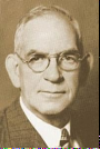
Carl Harry Claudy (1879 – 1957) was an American author, magazine writer, and journalist for the New York Herald.
His association with Freemasonry began in 1908, when, at the age of 29, he was raised a master Mason in lodge Harmony No. 17 in Washington, DC. He served as its master in 1932 and eventually served as Grand Master of Masons in the District of Colombia in 1943.
His Masonic writing career began in earnest when he became associated with the Masonic service Association in 1923, serving as associate editor of its magazine, The master mason, until 1931.
Under his leadership the service Association was brought to a place of predominance through his authorship and distribution of the short talk bulletin which made his name familiar to virtually every lodge in the country.
 Old Tiler Talks - Eyes Lifted High The Old Tiler Talks first published in 1925, by Carl Claudy, is a series of short anecdotal stories told in the setting of a new member asking an old tiler for his opinion on various masonic topics. These short articles are still very relevant, 100 years on, and hopefully provide some insight to new members today. |
 Old Tiler Talks - Masonic Libraries The Old Tilers talks first published in 1925, by Carl Claudy, is a series of short anecdotal stories told in the setting of a new member asking an old tiler for his opinion on various masonic topics. These short articles are still very relevant, 100 years on, and hopefully provide some insight to new members today. |
 Old Tiler Talks - So Many Rascals "Why are there so many rascals in the Fraternity, and why don't we turn them out?" a new member voiced to the old tiler for his opinion. These short articles are still very relevant, 100 years on, and hopefully provide some insight to new members today. |
 Old Tiler Talks - The Greatest Work The Old Tiler asked, "what is the greatest work of Masonry?" The New Brother sat by the guardian of the door and pulled out his cigar case. - Another instalment of wisdom by Carl Claudy, The Greatest Work |
 Old Tiler Talks - Why Men Love Freemasonry The 'Old Tiler Talks' first published in 1925, by Carl Claudy, is a series of short anecdotal stories told in the setting of a new member asking an old Tiler for his opinion on various Masonic topics. These short articles are still very relevant, 100 years on, and hopefully provide some insight to new members today. |
 Old Tiler Talks - Seeking a Little Light The Old Tilers talks first published in 1925, by Carl Claudy, is a series of short anecdotal stories told in the setting of a new member asking an old tiler for his opinion on various masonic topics. These short articles are still very relevant, 100 years on, and hopefully provide some insight to new members today. |
 The new mason laments that practically speaking, Masonry is a failure, and it depresses me … Masonry cannot be a failure, because men fail as Masons. The Old Tilers talk by Carl Claudy |
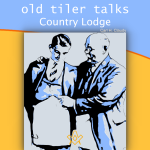 Old Tiler Talks - Country Lodge A lesson in the importance of an open mindset to observe, not to judge, but to learn and accept that we can achieve the desired outcome employing a different process. by Carl Claudy |
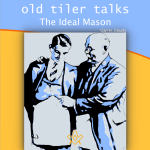 Old Tiler Talks - The Ideal Mason "What's your ideal of Freemasonry?" asked the Younger Mason - A short anecdotal story told in the setting of a new member asking an old tiler for his opinion on various masonic topics by Carl Claudy |
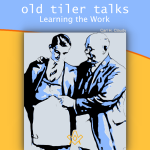 Old Tiler Talks - Learning the Work A short anecdotal story told in the setting of a new member asking an old tiler for his opinion on various masonic topics by Carl Claudy |
 Masonic first appointments and promotions might appear to be inequitable for one point a view, but some times, one point does not show the whole picture. A perfectly articulated story by Claudy, we should not compare one persons abilities with another. |
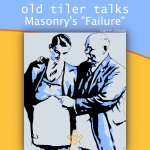 Old Tiler Talks - Masonry's 'Failure' Masonry fails because it doesn’t interest men sufficiently to make them practice what they preach. A perfectly articulated story by Claudy Masonry does not fail men. Men fail Masonry. Masonry has the teachings. |
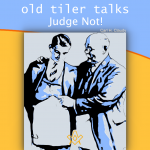 A perfectly articulated story by Claudy reminds us of a lesson from the Second Degree Charge; in the decision of every trespass against our rules, judge with candour, admonish with friendship, and reprehend with mercy. |
 Old Tiler Talks - A Masonic Speech A Masonic Speech - I can tell you the essence of appeal. It is drama. If you want your hearers to hang on your words, dramatize your subject |
 Old Tiler Talks - A Mason's Christmas A Mason's Christmas - Do you believe in Christmas celebrations should be held by the lodge ? Should members be asked to contribute to one and engage in Christmas festivities ? What is the old tilers take on this ? |
 Advertising - We would do more good in the world if we advertised ourselves more… Why ? |
 Uncover the mystery behind one of the oldest and most widespread symbols denoting God. |
 Do you want to discover the originals of the five points of fellowship ? |
 The mystery behind the two great pillars that stood at the porchway entrance of King Solomon Temple |
 Three numbers, what are their masonic significance? Pythagoras has something to say about them |
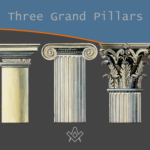 What are the Three Grand Pillars ?, wisdom, strength, and beauty - then later we hear of the Doric, Ionic, and Corinthian columns |
 This emblem contains more real food for thought than any other in the lecture of the Sublime Degree. |
 The Hiramic Legend is the glory of Freemasonry; the search for that which was lost is the glory of life |
 How are the Fellowcraft's five steps connected the five senses of human nature |
 How to explain the principle tents of the craft to a newly made brother |
 What are the lesser lights and where are they placed on our Lodges |
 Like so much else in Freemasonry the Middle Chamber is wholly symbolic |
 In the true sense of the words Freemasonry is not a secret society but a society with secrets. |
 Three Great Lights – the Volume of the Sacred Law, the Square, and the Compasses |
 Entered Apprentice Lambskin Apron; More ancient than the Golden Fleece or Roman Eagle, more honourable than the Star and Garter ... |
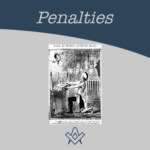 To the initiate, the penalty in his obligation comes with a shock of surprise and sometimes consternation. |
 What is a point within a circle |
masonic knowledge
to be a better citizen of the world
share the square with two brothers

click image to open email app on mobile device









